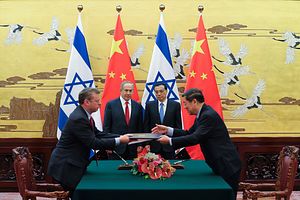Mercy Kuo regularly engages subject-matter experts, policy practitioners, and strategic thinkers across the globe for their diverse insights into Asia policy. This conversation with Alexander B. Pevzner – founder of the Chinese Media Center (CMC), an Israel-China media bridge; lecturer at the College of Management Academic Studies; and founding director of the China Program of the Israel Project – explores China-Israel relations, and the implications for the U.S. and the Middle East.
Explain China’s growing interest in Israel.
Despite a dearth of natural resources and a challenging geopolitical environment, Israel became a technological and innovation powerhouse. China is interested in Israel’s technology and innovation model, as it aims to transform its economic model from one based on manufacturing to one based on innovation and rise in the production value chain. Both Israel and China are both ancient civilizations and new countries, and have many areas in common, such as respect for tradition and family, and an emphasis on education.
Israel has become an attractive tourism destination for the growing Chinese middle class, with number of tourists from China in 2017 nearly tripling from 2015. Interest in Israel studies in China has also been growing, and cultural and media exchanges are commonplace. I believe the current vector of developing ties will continue.
Why is China investing in Israeli innovation and infrastructure?
Two main reasons: Chinese thirst for cutting-edge technology and the opportunities in Israel’s infrastructure sector, spurred by China’s Belt and Road Initiative (BRI). One important driver of Chinese interest in Israeli technology was the 12th Five-Year-Plan (adopted in March 2011), aimed at upgrading its industrial base, spurred by the global financial crisis that caused China’s export markets to dry up.
The first significant Chinese investment in Israel was when China National Chemical Corporation (ChemChina) bought Israeli agrochemicals manufacturer Makhteshim Agan Industries (later rebranded Adama) in 2011. After the successful visit of Israeli Prime Minister Benjamin Netanyahu to China in May 2013, Chinese investment started pouring into Israel. Chinese investment in Israel from 2011 is estimated at $15 billion, and with the current friction between the United States and China, the figure may rise further. Huawei has already established an R&D center in Israel and in May 2018, Alibaba founder Jack Ma visited Israel, and touted plans to invest in the Start-Up Nation.
What are the national security implications of China’s investments in Israel and Israel-U.S. relations?
With its huge market and growing, sophisticated middle class, China is a perfect partner for Israel, which lacks a significant domestic market and access to neighboring markets. While China enjoys good ties with the Arab world, relations between Israel and China are not burdened by past conflicts and their economies are highly complementary.
Relations between Israel’s ally the U.S. and China have become strained. In the past, this has impeded Israel’s ties with China, and may happen again. China’s close ties with Iran are also a cause for concern in Israel. However, the increasingly multipolar global architecture allows countries like Israel to maintain diverse bilateral relationships. Further, despite current noise, there are numerous areas where the U.S. and China, as the world’s two leading economies, simply must cooperate. Israel would be wise to use its position of having very good ties with both China and the United States.
What is Israel’s role in China’s Belt and Road Initiative (BRI)?
Israel is situated between Europe and Asia, between the Middle East and Africa. As such, its strategic positioning for China’s Belt and Road Initiative is obvious. In 2015 Israel became of the founding members of the China-led Asian Infrastructure Investment Bank (AIIB) as it seeks to further explore Asian markets. What’s more, not only is Israel at the nexus of China’s far-flung trade routes, but its stability is the exception in the turbulent Middle East.
Aware of the above advantages, Chinese companies are increasingly active in the infrastructure sector in Israel, earning excellent reputation for already completed projects. One Chinese company (China Harbor) is building a new port in Ashdod, while another ̶ Shanghai International Port Group ̶ won a 25-year concession to operate a new port in Haifa. The Belt and Road Initiative is a tremendous opportunity for Israel to boost its global presence in trade and economy while increasing its geopolitical significance.
What is the impact on Israel’s from China’s growing footprint in the Middle East?
Broader changes in the region and the Chinese leadership’s new foreign policy priorities are gradually influencing Chinese policy in the Middle East. China traditionally maintained friendly ties with the Arab world but it wasn’t particularly involved in the region. With the growth of the Chinese economy and the reliance on Middle Eastern oil, China has become more acutely aware of the need to have a footprint in the region ̶ witness the 2017 opening of the first overseas military base of the Chinese navy in Djibouti.
Under President Xi Jinping, China is eager for a more pre-eminent role in global affairs and it views the Israeli-Palestinian conflict as one arena where it can achieve this, though it will likely play only a declarative role for now. One advantage China has is its good ties with both Israel and the Arab world, but the intractability of the numerous Middle Eastern conflicts means no breakthroughs are imminent.

































